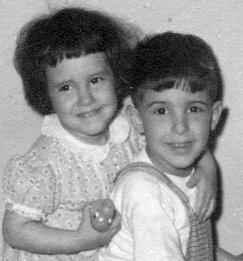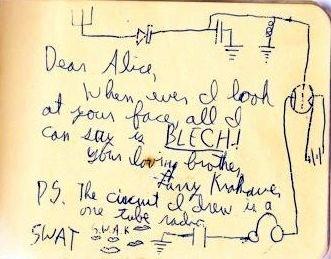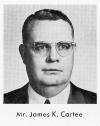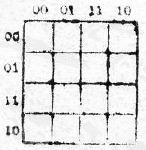
In our family, when some device or other goes on the blink, someone will invariably say, "Ask Larry." Larry knows a lot of things, particularly about electricity, physics, mechanics, and technology. We say "Ask Larry" with mostly straight faces, though there's a touch of irony that refers back to our mother's laughable worship of my brother's intelligence. My sister Phyllis and I used to mock her, clutching our chests and moaning "My Son, My Son!" But we do ask Larry. He doesn't know everything. Although our mother assumed Larry was the world's foremost authority on everything from carpentry to finance, there are whole areas of ignorance. But when your stove stops working, your refrigerator is getting warm, your toilet has issues, or your flat screen won't display high def, Larry will talk you through a diagnostic process and, more often than not, a solution. Larry was always a scientist. When I was 5 years old and Larry was 8, he performed an experiment to demonstrate how metal conducts heat. He put a spoon into a candle flame and pressed it against the back of my hand, causing a second degree burn for which I still have a scar.
Although Larry wasn't a top student, my parents recognized his promise and tried to nurture it. I remember washing the dishes as a teenager and watching my brother out the kitchen window as he wandered about the yard, pondering something or other. I was doing the dishes so that My Son My Son the boy genius could walk around thinking. The world at large began to take notice when Larry took the SAT's. He got two 800's and a 779. Taken by complete surprise, the high school guidance counselors sprung to life and mobilized around this dark horse. He was shepherded toward MIT, on the cusp of the computer revolution, destined to become an academic star and later, a high tech business success. When we were adults, my mother found some old psychological reports about Larry and me in a box of papers. My mother had taken us to a psychologist as young children to have our psyches probed and our IQ's tested. Reading from one of the reports, my mother told me that I was smarter than 1 in 1,000 people. There was something suspect in the way she said it, as though she were trying too hard to sound impressed with my IQ, overacting. I immediately asked her how smart Larry was. "One in 10,000." Later, I looked out my Manhattan apartment window and thought, 1 in 1,000, that's just this building and that one. Larry has an entire zip code. My sister Phyllis and I have to live with the fact that Larry will always be the designated Smart One. He's an asymptote we can never attain. But he's also funny, droll, and a faithful, loving brother. And in this modern world, it's nice to know that when some device or other fails, Larry's got my back. I can ask Larry. I don't think that Alice is exaggerating about my mother - it's possible that she actually did think I knew everything. If she had questions about pretty much anything, I was her go-to guy, to the point of absurdity. My brother-in-law Peter Jeswald designs houses, and has worked as a contractor in the past (more recently, he has authored several books on home design and remodeling). Note 1 Yet if my mother had any questions in this area, she would still phone me. No matter how many times I replied, "I don't know, why don't you ask Peter?", she seemed to always come to me first. I was as stunned as everyone else by my SAT scores, particularly the 800 in the English Achievement test (800 was the maximum possible score). I had been getting C's in English for years, and wasn't very interested in my English courses. My parents were friendly with Jack Fields, a Great Neck English teacher, and years later he bemoaned the fact that I had never been in one of his classes - he thought he would have been able to get me interested in the subject. I had always gotten A's in my math and science courses, but hey, that was math and science - they were easy. And my parents clearly thought I was smart, but didn't parents always think that?
I wouldn't be admitted to MIT today. In the class that entered in the Fall of 2009, nobody was admitted who was ranked below the top 20% of their high school class, and only three percent were admitted from the group that was ranked in the top 11% to 20%. But I was a good candidate for MIT in 1959. A high score on the Math Achievement Test was at the time the best quantitative predictor of success at MIT. It can be hard to remember that technology was much less important to society in 1959 than it is today. The only computers were large, multi-million dollar mainframes. Television was relatively new. There were no cellular telephones, there was no Internet, there weren't even radio-controlled garage door openers. The importance, and selectivity, of MIT has risen along with the importance of technology in the society at large. Some of my arcane knowledge came from actual courses. In high school in Great Neck, for example, I studied both typesetting (that is, setting lead type by hand for printing in a press) and "radio workshop" (how to put on the sort of radio dramas I used to listen to as a child). I think that both of these talents would now be considered obsolete. On the other hand, the touch-typing I learned there has been one of the most useful practical tools of my life, surviving the demise of the typewriter, and carrying me into the computer age.
But most of my random knowledge comes just from a relentless curiosity, and an inability to put anything into the "who cares?" category. Note 2 So I'll once again quote Bertrand Russell:   Note 1: Peter has a web page at http://peterjeswald.com/. [return to text] Note 2: At my former company of nearly 25 years, Kronos, I was informally called "The Krak", a name originally coined by our first office manager Vicky Ramsey. At a get-together in April 2011, Gil Sullivan and Bob Ledbetter told me that Kronos employees used to play a game called "Stump The Krak", in which they'd attempt to find obscure questions that I was unable to answer. I was never aware that this was going on. [return to text]  |

 When I was 10 and Larry was 13, he signed my autograph book. There was a ritual insult, of course, par for the genre. He wrote, "When ever I look at your face, all I can say is BLECH! Your loving brother, Larry Krakauer. PS. The circuit I drew is a one tube radio." Around the text he'd drawn a meticulously detailed diagram.
When I was 10 and Larry was 13, he signed my autograph book. There was a ritual insult, of course, par for the genre. He wrote, "When ever I look at your face, all I can say is BLECH! Your loving brother, Larry Krakauer. PS. The circuit I drew is a one tube radio." Around the text he'd drawn a meticulously detailed diagram.
 I took great pleasure in the reaction of my guidance counselor, whose yearbook picture is shown to the left (I don't think he actually had a stick up his ass). He scrawled across my SAT score sheet,
I took great pleasure in the reaction of my guidance counselor, whose yearbook picture is shown to the left (I don't think he actually had a stick up his ass). He scrawled across my SAT score sheet,  At MIT, I took courses in digital logic design, now done by only a small number of integrated circuit designers, who make extensive use of computerized tools. But we did our Boolean logic minimization manually. We made so much use of
At MIT, I took courses in digital logic design, now done by only a small number of integrated circuit designers, who make extensive use of computerized tools. But we did our Boolean logic minimization manually. We made so much use of